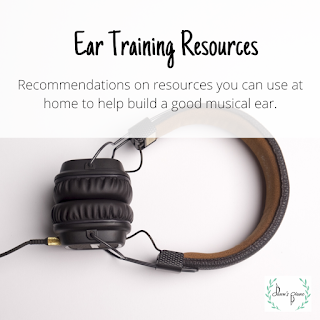Ear Training Resources for Piano Students
Ear Training is an essential musicianship skill. It's what allows us to hear when a note is out of place in a piece of music, or to pick out a melody by ear. It's one half of audiating, the true musician superpower which combines both sight and ear training to be able to read and 'listen' to a piece of music in our heads.
Some of the beginning stages of ear training are to recognize things like directional movement (whether the notes are going up, down or staying the same), distance (if they're skipping, stepping or jumping over an interval), and quality (if we hear a major or minor chord or interval). This week's post is a round-up of some simple ways to practice Ear Training at home to help your piano kid develop and grow in this direction out of lessons.
Auralia
While Auralia does offer a full curriculum for classroom & college teachers to assign to students ear training, in our studio we choose to isolate specific skills with the Auralia iOS apps. Whenever one of these is chosen as our 'App of the Week' group students will use these to build their auditory skills during their Piano Lab time. Each app pinpoints a specific skill starting with something as simple as Pitch Comparison all the way through Interval, Chord or Scale Recognition.
MusicTheory.Net
The best part about this resource is that it's free, and customizable. At musictheory.net students can find a list of exercises in everything from staff reading and key recognition to listening skills like interval recognition. You can set the parameters for your exercise to the specific intervals or notes you are hoping to improve on, and off you go! If you'd like to share results with your teacher, just copy the code provided at the end of an exercise and email that in.
Play a Tune by Ear
And finally, another great way to build ear training skills is to just try playing things you can hear. Start with small simple melodies (like the first few notes of Frere Jacques or Mary Had a Little Lamb), and then grow your way out from there. Even a simple game where your piano kid copies simple three or four note melodies that you make up is a great way to start.
Each Spring members of this studio have an opportunity to really exercise their ear training if they choose to participate in KMTA's Music Progressions. This is a non-competitive event where students perform a set of scales and a couple musical selections for a facilitator, as well as take a theory and listening exam. The resources mentioned above are the perfect way to help a piano student feel well-prepared for the listening portion of the exam. And even if your piano kid isn't preparing for an exam, and is just needing a little extra enhancement to their home practice, or perhaps some ways to engage their music off-the-bench while in the car or waiting for appointments, the apps and websites are also be a perfect to take your music on the go.
